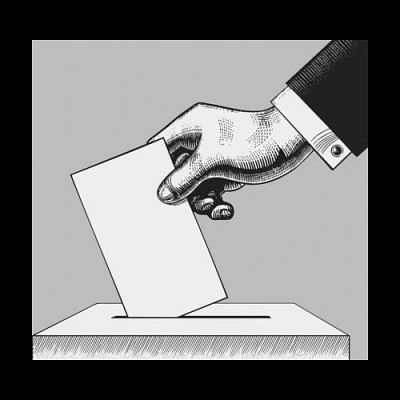Election Day Hoopla

Election Day in Bangladesh is usually a festive occasion. The weather is wonderfully crisp. We are in our Friday best. With friends and family, we throng to the polling centres to brave long lines armed with astute political analyses and roving eyes ready to spot ballot-box thieves. And snacks. Sometimes you don't even need to bring your own; they're provided by candidates. The unending lines are locations of euphoria. As each voter comes out with their thumbs splashed with black ink, a sign that they've voted and cannot cast another vote in another location, people often cheer, probably giddy from waiting, and the prospect of a glorious new beginning.
Democracy is a seductive notion, even at its bare minimum, which is voting. Elections are instruments of democracy, after all. It allows us to imagine that we have a role in how the country will unfold in the next few years. Is the idea that our voices will be heard magical in our context?
Magical thinking in the face of violence
Magical thinking makes us believe that everything is fine even when many things aren't, if the recent spate of violence is anything to go by. It doesn't actually matter who is behind the violent attacks on various candidates and party members; it doesn't matter if the violence is self-directed to make rivals look bad, as some might suggest. What matters is that the violence occurs in stark contrast with the shining numbers that herald Bangladesh's imminent transition from being a low-income to a middle-income nation. Indeed, our economic growth rate has been impressively high this past decade, even though it has been accompanied, as often is the case, by deepening income and social inequality. What matters is that these economic growth rates form the backdrop of our magical thinking, while the inequality foments unrest.
What matters more, in my estimation, is that when we see political violence directed at various political campaigns, candidates, and journalists, we feel immune to that violence because we are familiar with the said unrest; we are familiar with what violence does to the human body. We are not fazed by the gore, the maimed bodies; we are mostly glad that we weren't at the wrong place at the wrong time. Because magical thinking allows us to imagine them as isolated incidents.
However, the violence is anything but isolated. Over the last few weeks Dr Kamal Hossain's motorcade was attacked as were Zonayed Saki's party workers, BNP's Habibur Rahman Habib was stabbed a day after BNP's Goyeshwar Chandra Roy was injured with 30 others in Keraniganj, while Shamim Khan, a reporter from Jugantor, went missing after their office was attacked along with the offices of Jamuna TV. There was violence against the ruling party members too, but in a much smaller scale. These are but a handful of the numerous violent incidents which saw campaigns of at least 56 candidates being attacked and around 1,190 individuals being injured this election season.
Paranoia as an instrument of fear
Fear of what? It's not always clear. Sometimes it's a non-AL party that we are told to fear. Sometimes it's the fear of continued violence. Sometimes it's the fear of the return of the burning buses. So insidious is the fear-mongering that it takes on a life of its own, spiralling into more fear-mongering that takes the form of rumours and "inside scoops."
The violence and the rumours together make paranoia inevitable, perhaps. The paranoia first makes us ponder, then speculate. We concoct theories and become "experts." Some of us are convinced that we are a playground of superpower politics. Paranoia makes us think we have no agency because they control "everything." Some of us see the nation as under threat and in need of protection by "all means necessary." With the same conviction, some of us are convinced that the surveillance state has tapped all our phones and is watching our every move.
Can we step out?
On Election Day, I worry that we will either be paranoid or deep in our magical thinking. While magical thinking prevents us from critically assessing the promises that our political candidates have made to us, paranoia makes us feel like we have no voice. While magical thinking makes us blind as to who we are voting for as we vote for parties, markas, paranoia keeps us away from the polls.
This Election Day, let us step out of both these states—magical thinking and paranoia—because it is time for us to vote for individuals based on their ideals, based on whether they truly represent us and what we want for this nation that we so deeply love.
Let's vote for individuals who are good for us, and not just the party that we are emotionally attached to: individuals whose platform of fear-free Bangladesh must resonate profoundly with those of us who have been exposed to violence; individuals whose main goal is to empower adolescents by educating them; individuals who promise to address income inequality in their constituencies.
This Election Day, let us qualify the phrase "Amar bhot ami dibo, jake khushi taake dibo," to say that we will not vote for just anyone, but someone who deserves our vote. As we stand in line—presumably soon after the azaan for Fajr prayers, pondering who to vote for—may we do what is best for the collective "us". In case of a crisis in faith, let us remind ourselves that we have a history of fighting authoritarianism. If needed, we will fight again.
For now, with a hat tip to the activists who brought us democracy, let's head to the polls.
Nadine Shaanta Murshid is Assistant Professor, School of Social Work, University at Buffalo.





Comments